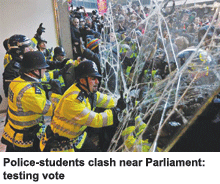Protesters clashed with police in London on December 9 after the Tory-LibDem coalition won a vote to increase tuition fees for university students in England to up to £9,000 (Rs.6.37 lakh) per year. The proposal faced bitter criticism not only from Labour MPs but from LibDem and Tory backbenchers, but the motion was carried by 323 votes to 302 in what has proved to be the most testing parliamentary vote to date for the coalition government which was voted to power in Westminster in May 2010.
 The result narrowed the coalition government’s notional majority of 84 to 21, in a vote which took place as thousands of protesters opposed to the rise in fees clashed with police in the streets outside parliament. Police entered Parliament Square to stop protesting students from vandalising the Treasury building. A number of students used concrete blocks and metal poles to smash windows of the building on Great George Street while being contained inside the square. Prince Charles and Camilla, Duchess of Cornwall, were “unharmed” after the car they were travelling in was attacked during the protest.
The result narrowed the coalition government’s notional majority of 84 to 21, in a vote which took place as thousands of protesters opposed to the rise in fees clashed with police in the streets outside parliament. Police entered Parliament Square to stop protesting students from vandalising the Treasury building. A number of students used concrete blocks and metal poles to smash windows of the building on Great George Street while being contained inside the square. Prince Charles and Camilla, Duchess of Cornwall, were “unharmed” after the car they were travelling in was attacked during the protest.
Ed Miliband, the Labour party leader, described the vote as “disappointing” for young people in the country. “What really concerns me is the impact this will have on social mobility and people getting on in our society,” says Miliband, who vowed that his party would campaign for “educational opportunity”.
According to Aaron Porter, president of the National Union of Students, the union has won over public opinion. The measure was passed “only because MPs have broken their promises”, he says. “We are incredibly disappointed and angry with politicians who have let us down so badly. They have voted for a policy they know is unfair, unnecessary and wrong.”
The vote followed five hours of debate which began rowdily as Labour MPs barracked Vince Cable, the LibDem business secretary, as he insisted that the controversial plans to triple the cap on tuition fees were “progressive”. Cable argued the tuition fee rise was a central part of a policy designed to “maintain high quality universities in the long term, tackle the fiscal deficit and provide a more progressive system of graduate contributions based on people’s ability to pay”.
(Excerpted and adapted from The Guardian)